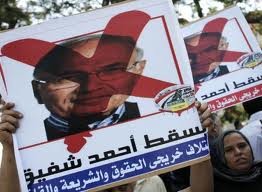(VOVworld) – The Egypt’s political arena has become ruffled again after the country’s 2nd round of presidential elections last week. What happens in this North African country is contrary to a stable political arena that Egyptians have expected after the elections. Perhaps the power struggle among many factions in Egypt has just begun. Hong Van has more….
Both candidates in Egypt’s "historic" presidential runoff over the weekend, Mohamed Morsi of the Brotherhood’s Freedom and Justice Party, and Hosni Mubarak’s former Prime Minister Ahmed Shafiq, are claiming victory. At a press briefing in Cairo on Tuesday, a campaigner for Amed Shafiq announced that his candidate won the election with 51.5% of the votes, surpassing his rival Mohamed Moursi. Earlier, on Monday, the Muslim Brotherhood also said Moursi won the election with 52.5% of the votes. The heat on the political arena intensifies as the spokesperson of the Muslim Brotherhood Mahmoud Ghozlan flatly warned of a conflict between people and the army if their candidate does not win the vote. The country’s electoral commission requests that both candidates to stop making annoucements of the election results. The Commission said results announced by both rival groups are not accurate. The annoucement of the election results scheduled for today, June 21st, will be postponed as the commission needs more time to investigate petitions of the difference between the number of votes and the number of voters registered at polling stations.
 |
| Protesters carry posters with defaced pictures of presidential candidate Ahmed Shafiq Thursday in front of the Supreme Constitutional Court in Cairo. Photo: internet |
While the 2 candidates are complaining about the election results, it is easy to see that whoever becomes president will only have the position, not the real power which is now held by the army. Analysts have even raised a question of whether the new President will be nothing?
From start of the 2nd round of the presidential elections, the Supreme Council of the Armed Forces (SCAF), currently running Egypt since Mubarak, made public the revised Constitution. Accordingly, this Council will hold the legislative power, as Parliament, which had been dissolved. The revised Constitution also states that SCAF is permitted to veto the new Constitution and interpose in the operations of the president. The public rejects the move and criticizes the council for trying to keep the power. Egyptian diplomat, former head of International Atomic Energy Agency, Mohamed Albaradei called revisions to Constitution of SCAF a severe failure of democracy and revolution in Egypt.
The move also ignited new conflicts in Egypt’s political arena. On Monday, 15,000 people gathered at the central Tahir square to reject SCAF’s bid to maintain power. The Muslim Brotherhood mobilized thousands of its members from the provinces to flock to the capital Cairo and join in demonstrations. Meanwhile, other Muslim parties of Egypt decided to sue the SCAF and the head of the Supreme Court for making the decision to dissolve the Parliament. These parties say that SCAF and the Supreme Court have no right to dissolve the parliament. MPs of the Freedom and Justice Party also warned of bringing this case to the international tribune. The Wasat party called on parliaments of Europe, Arab, and other countries to discuss this issue and suggest appropriate actions. Meanwhile, the Nour party warned that this would cause severe consequences to the country. To deal with the situation, Egyptian army has enhanced its forces on routes connecting Cairo and Alexandria. This is the first time, such numbers of military vehicles have been deployed near Cairo since President Mubarak was ousted in 2011.
Even before the election results are made clear, Egypt’s political arena has fallen into a new power conflict. In other words, Egypt has gone from one political blockade to another. It is predicted that instability is not over for this populous country.
Hong Van